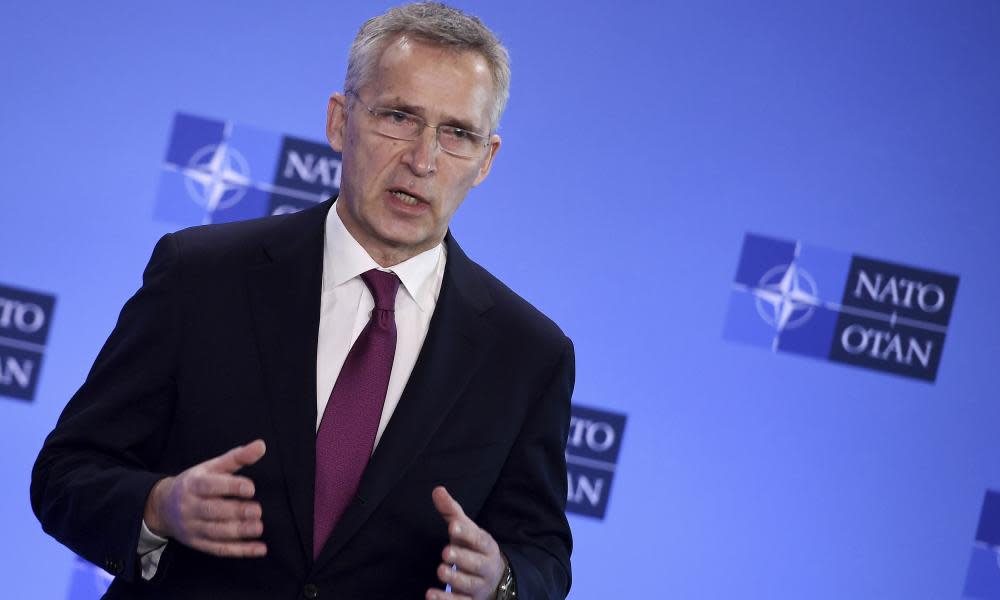Nato chief warns of worse suffering in Ukraine and Russian attacks elsewhere

The suffering of the Ukrainian people at the hands of Russian forces is set to worsen in the coming days and the war is at risk of spreading elsewhere in Europe, Nato’s secretary general has said.
Following a meeting of the alliance’s foreign ministers, Jens Stoltenberg said the civilian death toll was mounting, with cities under siege and schools and homes being destroyed.
In the latest sobering assessment of the military situation, he told reporters that there was evidence of the use of cluster bombs and “other types of weapons which would be in violation of international law”.
Stoltenberg further warned that the risk of Russian military attacks or “subversion” was rising in Georgia, on whose territory Vladimir Putin’s troops are already present, and Bosnia-Herzegovina, where Bosnian Serbs have been threatening to break up the state with the Kremlin’s support.
“The days to come, are likely to be worse,” Stoltenberg told reporters in Brussels. “With more death, more suffering, and more destruction as the Russian armed forces bring in heavier weaponry and continue their attacks across the country.”
He added: “The Kremlin’s ambition is to recreate a sphere of influence and deny other countries the right to choose their own path. So ministers discussed the need to support partners who may be at risk, including Georgia and Bosnia-Herzegovina.
“Russia’s aggression has created a new normal for our security, where fundamental principles are contested through the use of force and we face the threat of conflict for years to come.”
He said Georgia and Bosnia-Herzegovina may be at risk of “even more intervention, subversion and potentially even attacks by the Russian armed forces”.
Ukraine’s foreign minister Dmytro Kuleba addressed the Nato foreign ministers, including the British foreign secretary, Liz Truss, and the US secretary of state, Antony Blinken.
The calls from Ukraine for Nato to police a “no-fly zone” over the country had been raised during the meeting in Brussels but Stoltenberg said the alliance could not directly engage with Russian forces.
He said: “We have a responsibility as Nato allies to prevent this war from escalating beyond Ukraine, because that will be even more dangerous, more devastating, and will cause even more human suffering. So we have made it clear we are not going to move into Ukraine neither on the ground or in the Ukrainian airspace.
“Of course, the only way to implement a no-fly zone is to send Nato planes, fighter planes into Ukraine airspace, and then impose that no-fly zone by shooting down Russian planes.
“Our assessment is that we understand the desperation but we also believe that if we did that, we’ll end up with something that could end in a fully fledged war in Europe involving many more countries and causing much more human suffering.”
Meanwhile Vladimir Putin warned Russia’s neighbours “not to escalate the situation” by imposing more restrictions on his country during the latest broadcast of a government meeting in Moscow.
“There are no bad intentions towards our neighbours,” Putin said. “I would also advise them not to escalate the situation, not to introduce any restrictions. We fulfil all our obligations and will continue to fulfil them.”
Related: ‘Ninety per cent of houses are damaged’: thousands trapped in Ukraine’s small towns
Stoltenberg, Blinken and Truss will join EU foreign ministers at an extraordinary meeting later on Friday to discuss the impact of the west’s imposition of far-reaching sanctions on Russia and the next steps.
The issue of creating humanitarian corridors, agreed during Thursday’s meeting between Ukrainian and Russian officials, will also be on the agenda.
More than 1.2 million people have fled Ukraine into neighbouring countries since Russia launched its full-scale invasion on 24 February, according to the latest UN figures.
The United Nations security council will hold an emergency meeting in New York in response to the attack on the Zaporizhzhia nuclear power plant by Russian troops, who have now seized the area.
The session was requested by the British prime minister, Boris Johnson, with the support of the US, France, Norway, Ireland and Albania.

 Yahoo News
Yahoo News 
